Evolution
and other words that don't exist in Biblical Hebrew
It will likely surprise no one that the modern Hebrew word “evolutziya-אבולוציה” (meaning “evolution”) is not a word sourced in authentic Biblical Hebrew, but an English word that was imported and adapted into modern Hebrew in the 20th century.
In 1953, the Israeli government established The Academy of the Hebrew Language to research and adjudicate issues of the newly established language of modern Hebrew while preserving its authenticity as it faced the forces of modernity.1 Ironically, they called their institution for the preservation of Hebrew’s authenticity “Ha’Akademia La’Lashon Ha’Ivrit — הָאָקָדֶמְיָה לַלָּשׁוֹן הָעִבְרִית,“ using a word, “akademia” (i.e. “academy”) that is as authentic to Biblical Hebrew as “evolutziya-אבולוציה” .
This, for me, is a cute illustration of how much smaller the Hebrew vocabulary of the Torah is compared to the vocabulary of modern English. How much smaller is Biblical Hebrew? About 100 times smaller.2 Hence, the need to import words into modern Hebrew to flesh it out as a modern language.
Elizer ben Yehuda, the father of modern Hebrew and his successors needed to be resourceful and plagiarize from other languages to come up with words for concepts they couldn’t source in Tanakh or the Mishnah. English would serve handsomely to fill the gaps in Hebrew as it was and is a massive linguistic melting pot, borrowing and blending from other languages as a result from immigration, commerce, and colonialism in the British Commonwealth and the United States.

Biblical Hebrew, on the other hand, self-identifies as Divine in origin. The practical upshot of a language designed by God is that it would possess precisely the number of words it needs to convey the essential kernels of reality — no more, no less.3
Now, back to evolution. Evolution is one of the foundational concepts in modern science. It’s rare to read an article about psychology, sociology, economics, philosophy or medicine that doesn’t at least mention evolution as the underlying explanation for whatever is being discussed. The word was coined in 1864 by English philosopher/scientist Herbert Spencer. The basic workings of the theory were later developed and made famous by Charles Darwin, but was simultaneously worked on by the lesser known Alfred Russel Wallace, and after a century and a half of research all over the world, has become ubiquitous.
As we mentioned above, there is no indigenous Hebrew word for “evolution.”
On the other hand, seeing as the body of evidence for evolutionary processes at work in the development of life on Earth, maybe it should surprise us that there is no word for it. Does the lack of a Biblical Hebrew word for a thing mean that the thing in question doesn’t exist?
If evolution is as real as it seems to be, why isn’t there a word for it?
The Torah is laser-cut in its precision when describing things, verbs or properties that have clear, logical distinctions. One area in which we can see this is the different words for creation itself:
Bara (ברא) - to create something “out of thin air” that did not exist before — even conceptually (creatio ex nihilo).
Yatsar (יצר) - to develop the form (tsura-צורה) and function of that which has already been created.
Asah (עשה) - to finalize its practical manifestation.
Because many believers, agnostics and atheists alike possess a vision of God that is abstract and distant, the only sort of creative action they would associate with Him is “bara” — the sudden, lightning-from-Heaven, boom!, bam!, wow!, and-there-you-have-it-folks! sort of creation.
However, a close look at the story of creation in the beginning of the Torah reveals that the word “bara” — creation from nothing — appears only in connection to 3 very particular moments in the creative process in which new things, without precedent emerge into reality:
The creation of the primal stuff of the cosmos, the energy contained in the singularity of the Big Bang:4
Bereishit 1:1 (with commentary of Ramban):
בְּרֵאשִׁית בָּרָא אֱ-לֹהִים אֵת הַשָּׁמַיִם וְאֵת הָאָרֶץ׃
In the beginning, God created (bara) the Heavens and the Earth.
The emergence of will and consciousness:5
Bereishit 1:21 (with commentary of Vilna Gaon):
וַיִּבְרָא אֱ-לֹהִים אֶת־הַתַּנִּינִם הַגְּדֹלִים וְאֵת כׇּל־נֶפֶשׁ הַחַיָּה הָרֹמֶשֶׂת אֲשֶׁר שָׁרְצוּ הַמַּיִם לְמִינֵהֶם וְאֵת
כׇּל־עוֹף כָּנָף לְמִינֵהוּ וַיַּרְא אֱ-לֹהִים כִּי־טוֹב׃
God created (bara) the great sea creatures and all of the living consciousness that crawls and is spawned in water by species and all flying winged creatures by species, and God saw that it was good.
The appearance of human uniqueness, conscience, and the marital unit:6
Bereishit 1:27 (with commentaries of Rashi and Malbim):
וַיִּבְרָא אֱ-לֹהִים אֶת־הָאָדָם בְּצַלְמוֹ בְּצֶלֶם אֱ-לֹהִים בָּרָא אֹתוֹ זָכָר וּנְקֵבָה בָּרָא אֹתָם׃
God created-from-nothing (bara) humanity, each person in his [unique] image — in the image of God He created (bara) him; male and female He created (bara) them.
Everything in between, is not beriah (creatio ex nihilo) but yetzira or asiya, a giving of shape to that which already existed.
Rashi 1:14:
“…all that emerges from the heaven and earth were created on the first day, but each of them was [simply] put in its place on that day when it was so commanded…”
Ramban 1:1:
“Initially, [God] brought forth from total and absolute nothing an extremely ethereal substance devoid of corporeality but having a power of potency, fit to take on any form and to proceed from potentiality into reality. This was the primary matter created by God. It is called by the Greeks hyly (prime matter) [and by modern scientists energy]. After the hyly, He did not create anything, but He formed and made things with it, and from this hyly He brought everything into existence and clothed the forms and put them into a finished condition.”
Even a cursory look at the Torah’s account of creation shows a process that is generally compatible with an organic process of evolution from:
simpler inanimate elements (like light)
to growing, living vegetation to conscious, moving animal life
to intelligent, communicating, free-choosing human beings.
So why is there no word in Biblical Hebrew for this magnificent process of unfolding of reality from within itself that the Torah is so careful to articulate?
It’s for the same reason that there is no word in Biblical Hebrew for “nature.”7 In modern English, we tend to personify nature. There’s a long standing pagan tradition of doing so, referring to it as “Mother Nature” or “Gaia.” As elegant and powerful of a theory as evolution is, and as much as the Torah may describe the development of the world in a way that is organic and evolutionary — as opposed to synthetic and sudden acts of God — Hebrew does not give a name to evolution so as to not personify it. It is, after all, ironic that intelligent, secular people who adamantly refuse to believe that there is a fundamental will and intelligence underlying the universe habitually personify the universe, nature, evolution, and randomness as autonomous actors.
While evolution certainly has its natural mechanisms, it is Hashem Who is behind it. Neither mutations, nor changes in climate are random. The unfolding of the universe in the Torah is indeed natural, but it is moved along quite clearly by the deliberate commands of the Creator, Who says “let there be light,” “let the earth sprout vegetation,” “let the waters teem with conscious living creatures.”
Only the personified randomness of evolution is negated by the Torah — not the process.
“Only the personified randomness of evolution is negated by the Torah — not the process.”
Rav Avraham Yitzchak HaKohen Kook, Orot 565:
“Evolution itself—rising step by step from the lowest forms to the highest—shows with great clarity that existence follows a far-seeing vision, a purpose set in advance. This only deepens the sense of Divine greatness. It strengthens every foundation of faith, and makes our trust in God and our service of Him even more fitting…There is, therefore, no real difficulty in harmonizing the words of the Torah or the teachings of our tradition with an evolutionary understanding.”
Rav Kook, no doubt unique in his open-mindedness, not only saw no conflict between evolution and the Torah, but saw in the notion of evolution a manifestation of Hashem’s Dynamic Perfection.
Rav Avraham Yitzchak HaKohen Kook, Shmoneh Kvatzim 1:443:
“What do we mean when we speak of Divine perfection?
“We might be tempted to think of it as the same kind of perfection we see in created things — the perfected state that results from a complete and finished existence, beyond which nothing can be added. If that were the case, Divine perfection would mean that nothing more could be added to it.
“But this is impossible. For in the Divine, perfection does not negate the possibility of addition. Rather, there is a perfection that includes the power of infinite growth and addition — a perfection that is not static, but dynamic, ever-ascending, overflowing with new vitality and revelation.”
May continue to see the evolutionary process of the purification of our language that heralds the next evolutionary stage of humanity:
Zechariah 3:9 & 14:9:
כִּי־אָז אֶהְפֹּךְ אֶל־עַמִּים שָׂפָה בְרוּרָה לִקְרֹא כֻלָּם בְּשֵׁם ה׳ לְעׇבְדוֹ שְׁכֶם אֶחָד׃
“For then I will turn to the peoples a pure language that they may all call upon the name of Hashem with one, unified effort.”
.בַּיּוֹם הַהוּא יִהְיֶה ה׳ אֶחָד וּשְׁמוֹ אֶחָד…
…on that day, Hashem will be One, and his Name with be One.”
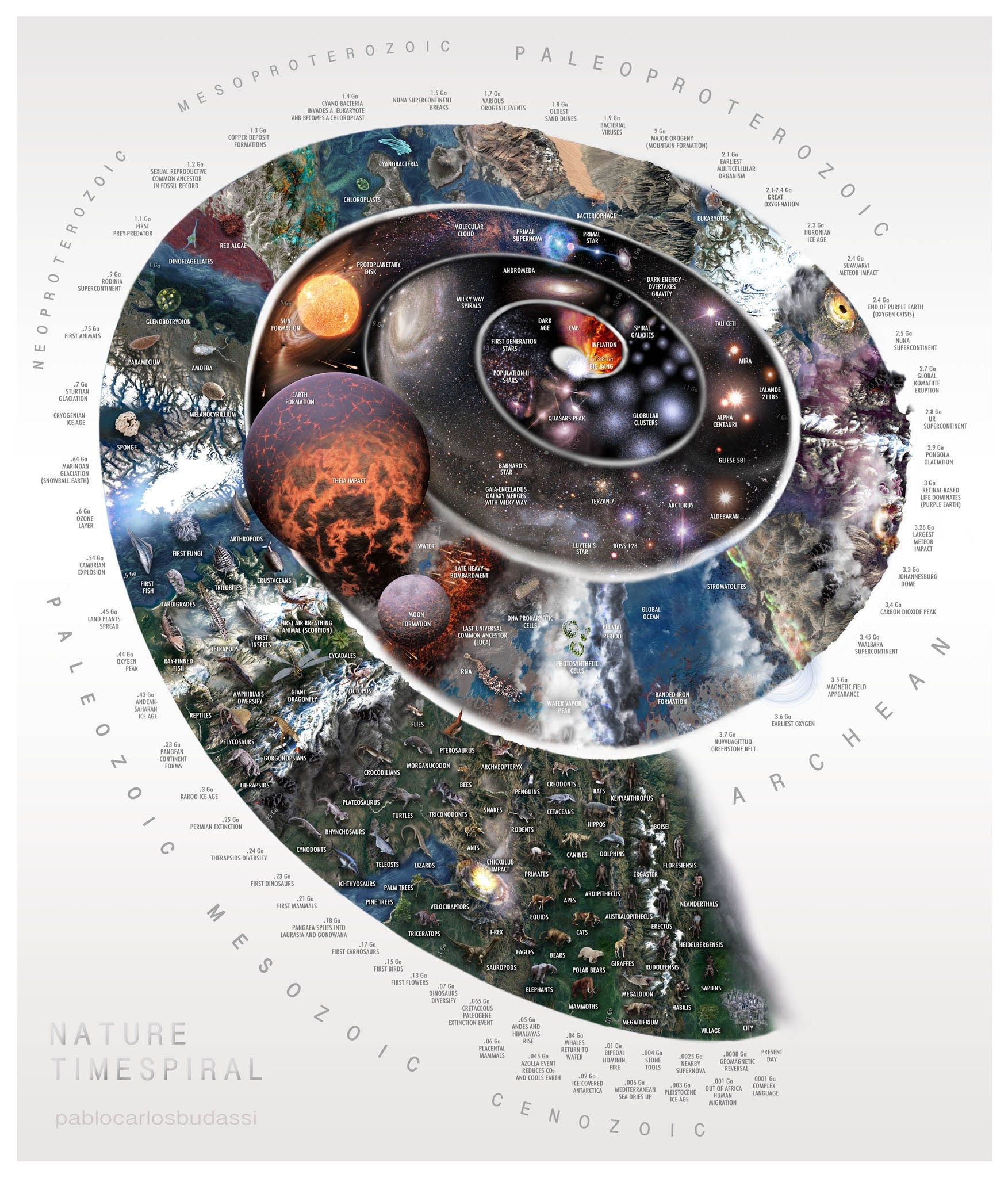
It replaced the Hebrew Language Committee (Vaʻad ha-lashon ha-ʻIvrit), which was established in 1890 by Eliezer Ben Yehuda, the undisputed driving force of the Hebrew language’s revival.
A little bit of research showed me that there is a massive disparity (~100X) in the number of lexemes in Biblical Hebrew compared to the number of lexemes in Modern English. What’s a “lexeme”? (I didn’t know either.) A “lexeme” is a word that would be an entry in a dictionary (so as to not double count “cat” and “cats”). Biblical Hebrew is estimated to have 10,000 lexemes. Modern English might have as many as a 1 million.
We’ve made this point before. Check out the 3-part mini-series on the 12 Hebrew words for the “12 flavors of happiness."
12 Flavors of Happiness: Part 1
There are at least 12 words for happiness in the Hebrew language. Each of them expresses a different depth and nuance. If you want to be a connoisseur of these flavors of joy, you want to learn these words to be able to recognize them.
Physics operates with a principle of conservation of matter and energy (although they can be converted from one to the other through Einstein’s famous formula E = mc2). The Big Bang posits that all of spacetime and everything in it was contained in a singularity i.e. a point of zero dimensions. Where that singularity ultimately came from is one of the impossible questions of science.
The emergence of consciousness from a physical world is perhaps the most important frontier of science — at the nexus of physics, chemistry, biology, neuroscience, computer and cognitive science, psychology and spirituality. Watch these two videos to get your mental gears turning on the subject:
These three elements are new emergent features of the universe, having no corollary before them, except for in God Himself: 1) uniqueness, 2) the freedom to create, and 3) the marital unit.
“Teva–טבע” is a creation of rabbinic Hebrew.




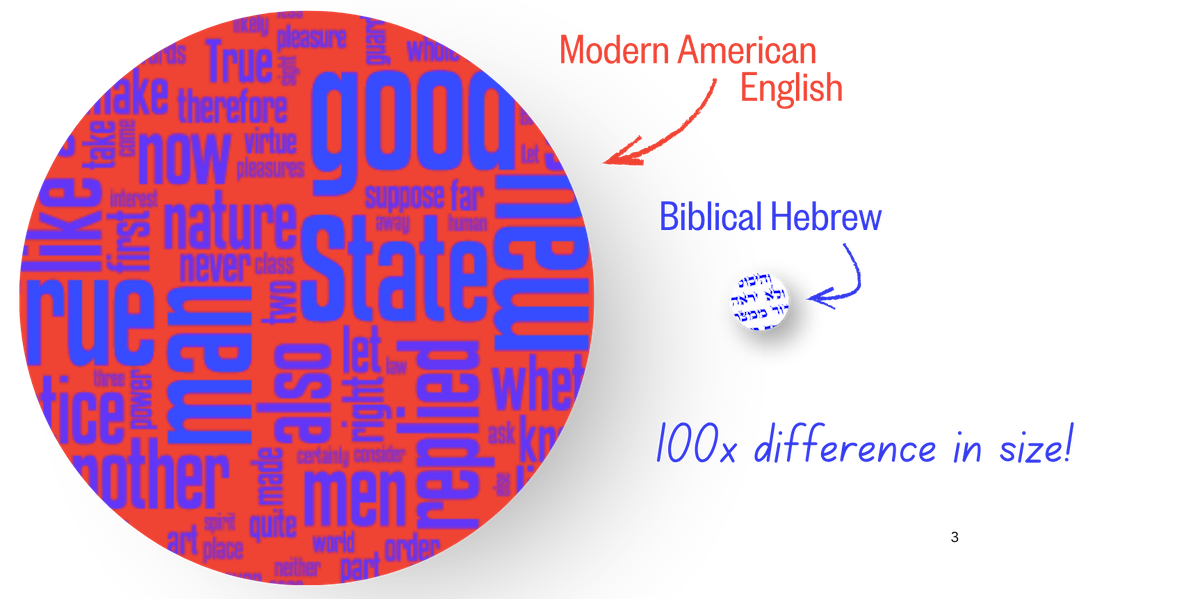
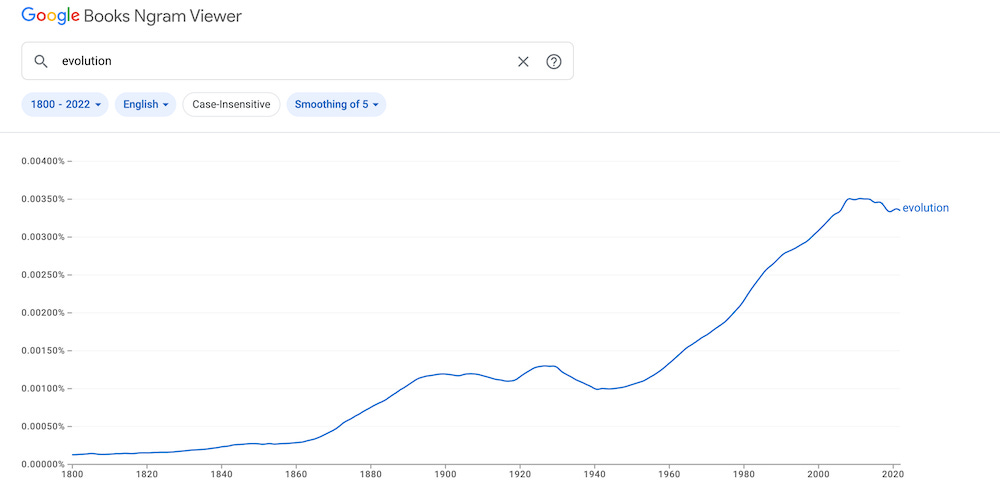
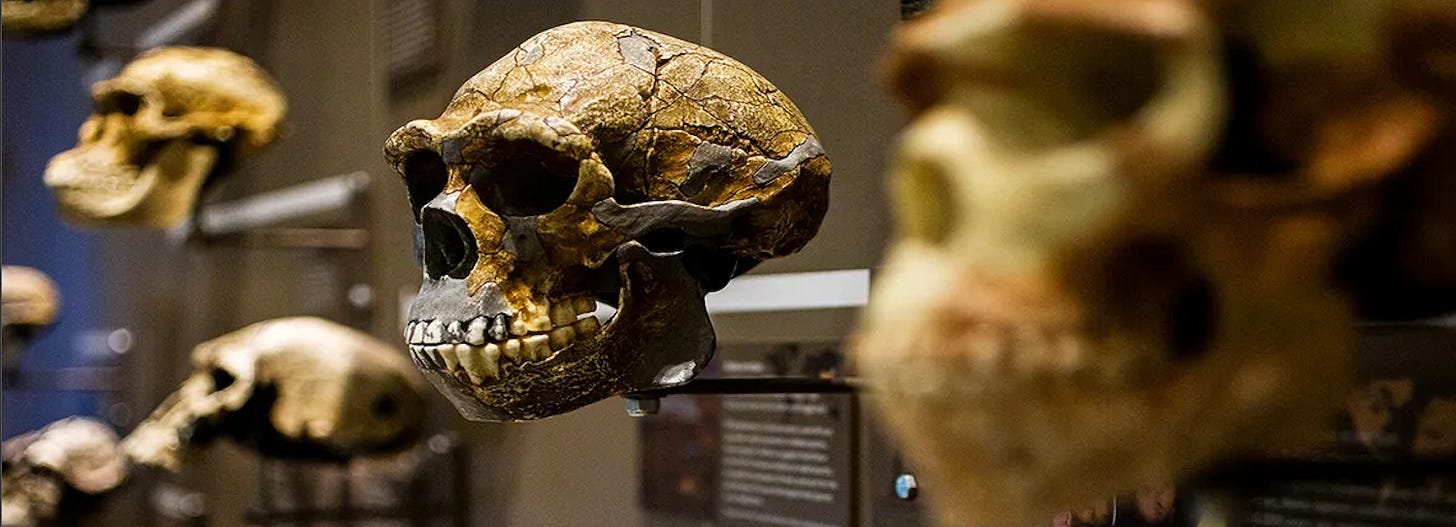
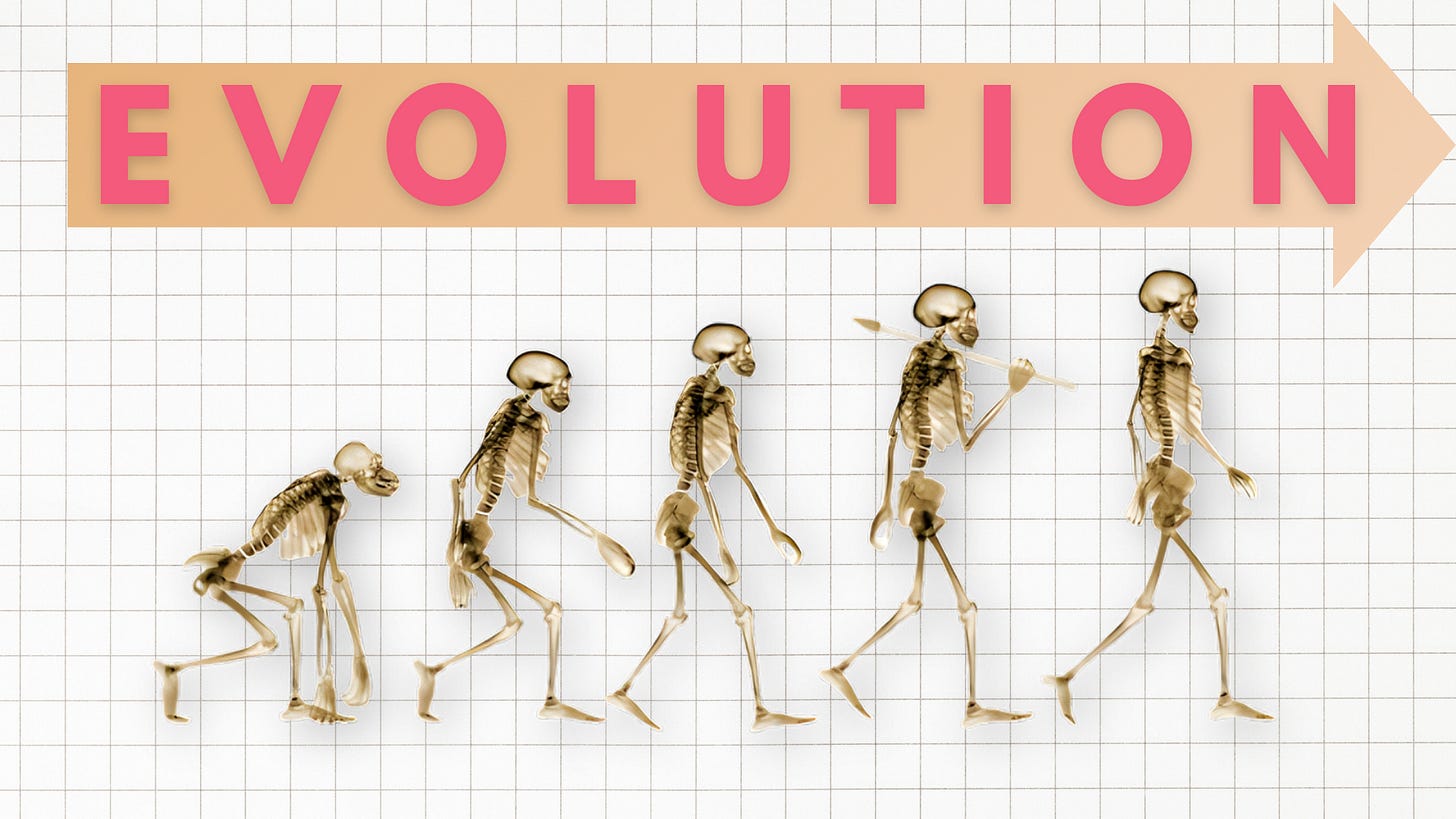

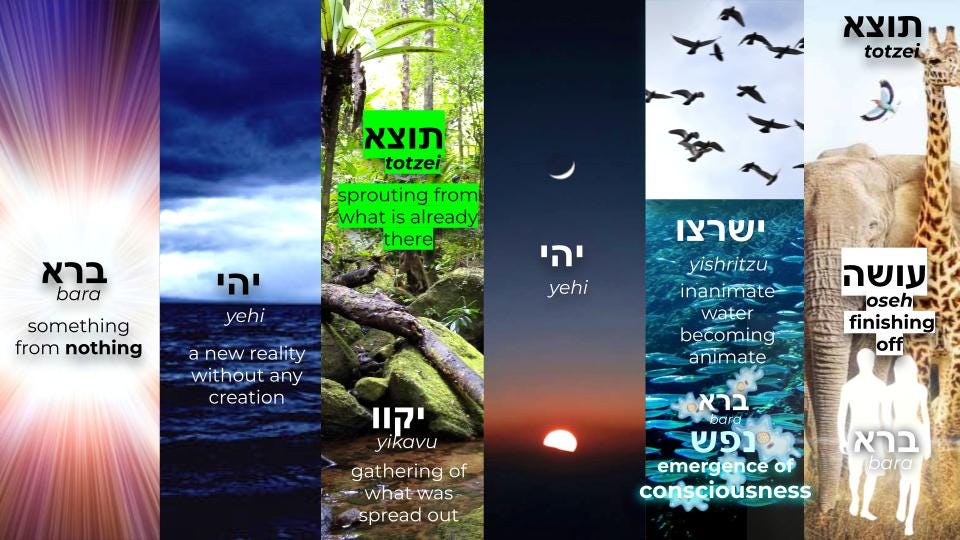

Muy bueno Jacki!